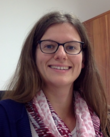Supramolecular and Cellular Simulations
Prof. Dr. Sabine Fischer

Center for Computational and Theoretical Biology (CCTB)
Klara-Oppenheimer-Weg 32
Campus Hubland Nord
97074 Würzburg
Telefon: +49 931 31-83961
E-Mail: sabine.fischer@uni-wuerzburg.de
My research focus is on spatial interactions in biological systems at different length scales. For this, I apply and adjust techniques from data analysis and mathematical modelling such as image analysis, spatial statistics, agent-based modelling and machine learning. I enjoy working in an interdisciplinary environment and utilising the different perspectives for solving interesting research questions.
Research
We work on data-driven modelling and simulations of processes at the subcellular, multicellular and multitissue scale. For the data analyses, we develop and apply tools that range from classical statistics to machine learning approaches. To test hypotheses about interactions of structure and function at the different scales, we use mathematical modelling and simulations. In particular, we use on- and off-lattice agent-based modelling in two and three spatial dimensions as well as three-dimensional morphological modelling with Blender.
We are part of the DFG priority program
SPP 2332 "Physics of Parasitism”,
the ESF project "Forum KIdT - Künstliche Intelligenz und digitale Transformation" and associated to
the SFB / TRR 225 “Biofabrication”.
We offer internships, Bachelor and Master theses as well as Zulassungsarbeiten (Lehramt)
In general, we are looking for highly motivated candidates who are team-oriented, willing to learn and work independently and precisely:
- Keen interest in one of our projects, quantitative data analysis and/or mathematical modelling, and programming (prior knowledge in any of these is not required)
- Enthusiasm for communication with experts from other disciplines
We offer a friendly working environment, excellent computing infrastructure and supportive supervision.
If you are interested, please contact Sabine Fischer for further details.
Beta-Tester for julia programming course

We are looking for people that are interested in learning the programming language julia.
If you want to have a go, feel free to download our course and work on one or more parts of it. We would appreciate it a lot if you would let us know any feedback that you might have. Thank you!
Publications
- [ 2025 ]
- [ 2024 ]
- [ 2023 ]
- [ 2022 ]
- [ 2021 ]
- [ 2020 ]
- [ 2019 ]
- [ 2018 ]
- [ 2017 ]
- [ 2016 ]
- [ 2015 ]
- [ 2014 ]
- [ 2013 ]
- [ 2011 ]
- [ 2010 ]
-
Visualizing the transcription and replication of influenza A viral RNAs in cells by multiple direct RNA padlock probing and in situ sequencing (mudRapp-seq). . In Nucleic Acids Research, 53(11). Oxford University Press (OUP), 2025.
-
mTOR controls growth and internal architecture of human breast cancer spheroids. . In bioRxiv, bl 2024.02.24.580871. Cold Spring Harbor Laboratory, 2024.
-
Aggregation of adult parasitic nematodes in sex-mixed groups analysed by transient anomalous diffusion formalism. . In Journal of The Royal Society Interface, 21(219). The Royal Society, 2024.
-
Inference of alveolar capillary network connectivity from blood flow dynamics. . In American Journal of Physiology-Lung Cellular and Molecular Physiology. American Physiological Society, 2024.
-
Quantification of Trypanosoma Brucei social motility indicates different colony growth phases. . In bioRxiv. Cold Spring Harbor Laboratory, 2024.
-
Adjusting the range of cell--cell communication enables fine-tuning of cell fate patterns from checkerboard to engulfing. . In Journal of Mathematical Biology, 87(4), bl 54. 2023.
-
The salt-and-pepper pattern in mouse blastocysts is compatible with signalling beyond the nearest neighbours. . In iScience, bl 108106. Elsevier {BV}, 2023.
-
Recognition and reconstruction of cell differentiation patterns with deep learning. . In PLOS Computational Biology, 19(10), bll 1–29. Public Library of Science, 2023.
-
Tissues as networks of cells: towards generative rules of complex organ development. . In Journal of The Royal Society Interface, 20(204), bl 20230115. The Royal Society, 2023.
-
Adjusting the range of cell-cell communication enables fine-tuning of cell fate patterns from checkerboard to engulfing. . In arXiv, bl 2211.07241. 2022.
-
Interactive, Visual Simulation of a Spatio-Temporal Model of Gas Exchange in the Human Alveolus. . In Frontiers in Bioinformatics. Frontiers, 2022.
-
Recognition and reconstruction of cell differentiation patterns with deep learning. . In arXiv, bl 2212.10058. 2022.
-
On-lattice Vicsek model in confined geometries. . In arXiv, bl 2105.08792. 2021.
-
Interactive, visual simulation of a spatio-temporal model of gas exchange in the human alveolus. . In bioRxiv, bl 2021.09.15.460416. 2021.
-
NANOG/GATA6 Interactions Revisited: A Statistical Mechanics Approach towards Cell Fate Decisions. . In arXiv, bl 2107.04501. 2021.
-
Global cell-cell communication enables spatial segregation of cells in organoids of the inner cell mass. . In arXiv, bl 2111.01624. 2021.
-
The transition from local to global patterns governs the differentiation of mouse blastocysts. . In PLOS ONE, 15(5), bll 1–29. Public Library of Science, 2020.
-
Cell fate clusters in ICM organoids arise from cell fate heredity and division: a modelling approach. . In Scientific Reports, 10(1), bl 22405-. 2020.
-
A GABAergic and peptidergic sleep neuron as a locomotion stop neuron with compartmentalized Ca2+ dynamics. . In Nature Communications, 10(4095). 2019.
-
Mouse ICM organoids reveal three-dimensional cell fate clustering. . In Biophysical Journal, 116, bll 127–141. Elsevier, 2019.
-
An Introduction to Image-Based Systems Biology of Multicellular Spheroids for Experimentalists and Theoreticians. . In Computational Biology, H. Husi (red.). Codon Publications, Brisbane, Australia, 2019.
-
Immersive Analysis of 3D Multi-cellular In-Vitro and In-Silico Cell Cultures. . In 2019 IEEE International Conference on Artificial Intelligence and Virtual Reality (AIVR), bll 82–89. 2019.
-
Electroluminescence imaging and automatic cell classification in mass production of silicon solar cells. . In 2018 IEEE 7th World Conference on Photovoltaic Energy Conversion (WCPEC) (A Joint Conference of 45th IEEE PVSC, 28th PVSEC 34th EU PVSEC), bll 3298–3304. 2018.
-
The molecular recognition of phosphatidic acid by an amphipathic helix in Opi1. . In J Cell Biol, 217(9), bll 3109–3126. 2018.
-
E-cadherin, actin, microtubules and {FAK} dominate different spheroid formation phases and important elements of tissue integrity. . In Biology Open, bl bio.037051. The Company of Biologists, 2018.
-
Multiscale image analysis reveals structural heterogeneity of the cell microenvironment in homotypic spheroids. . In Scientific Reports, 7, bl 43693. The Author(s), 2017.
-
Identifying the necrotic zone boundary in tumour spheroids with pair-correlation functions. . In Journal of The Royal Society Interface, 13, bl 20160649. The Royal Society, 2016.
-
Robust and automated three-dimensional segmentation of densely packed cell nuclei in different biological specimens with Lines-of-Sight decomposition. . In BMC Bioinformatics, 16, bl 187. 2015.
-
Lateral assembly of N-cadherin drives tissue integrity by stabilizing adherens junctions. . In Journal of The Royal Society Interface, 12, bl 20141055. The Royal Society, 2015.
-
Contractile and Mechanical Properties of Epithelia with Perturbed Actomyosin Dynamics. . In PLOS ONE, 9(4), bll 1–12. Public Library of Science, 2014.
-
Is a Persistent Global Bias Necessary for the Establishment of Planar Cell Polarity?. . In PLOS ONE, 8(4), bll 1–12. Public Library of Science, 2013.
-
Endocytic and recycling endosomes modulate cell shape changes and tissue behaviour during morphogenesis in Drosophila. . In PLoS One, 6(4). 2011.
-
Integrative approaches to morphogenesis: lessons from dorsal closure. . In Genesis, 49(7), bll 522–533. 2011.
-
Modelling and Analysis of Planar Cell Polarity. . In Bulletin of Mathematical Biology, 72(3), bll 645–680. 2010.



